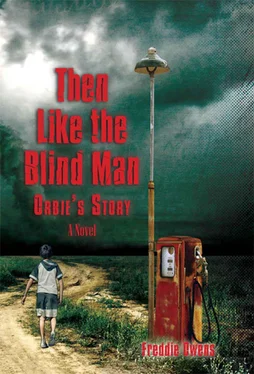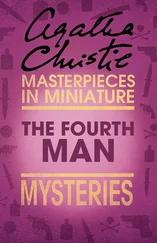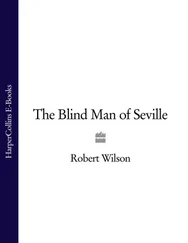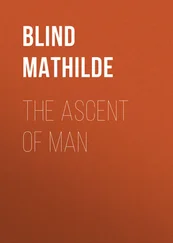Granny pointed again. “They’re over that way, near where that break is. Your other Granny and Granpaw. Granny and Granpaw Ray.”
“And Daddy,” I said.
“That’s right. Dead people needs to be took care of too, you know. Not left around like this.” Granny motioned her hand out over the graves. “All growed over with weeds.”
We made our way through picker bushes, around crosses and gravestones, toward the busted out place where a few slats of the fence still lay broken on the ground. Something inside the weeping willow tree’s umbrella of leaves startled me, a dim shape of something or somebody hunched over in there, breathing and alive. It caused the hairs on my neck to stand.
“I declare!” Granny shouted. “Bird! What you doing in there?”
The shape parted the leaves with a gnarled cane and waddled out in the sun. It was Bird Pruitt — Old Man Harlan’s hunchback cousin — bent under a lopsided hump and wearing a thick purple dress that drooped dead to the ground.
“Ain’t you hot in that?” Granny said.
“Ain’t nobody’s business if I am,” Bird said as she waddled up closer. On her head sat a purple pillbox hat, its wiry net bent up in the air like frozen smoke, only purple colored. She reached out with the gnarled cane and poked me in the chest. “You! Ruby’s boy! I never did get to whip you.”
Missy and me had stayed once with Bird when Momma and Victor went off to Circle Stump with Granny — the first and only other time Victor had been down. Bird had said then that Victor ought to whip me more because my real Daddy never. Said all my real Daddy ever did was spoil me. I told her to shut her old mouth and she came at me with her cane.
“Leave him alone,” Granny said.
Bird took her cane away. “You are Ruby’s boy, ain’t you?”
“His names Orbie,” Granny said. “You know who he is.”
Bird kept her eyes on me. “You awful skinny, Ruby’s boy. Have to fatten you up.” She reached out for one of my arms.
“Don’t,” I said, backing away.
Half her teeth were gone, and I could almost see the bone of her skull, just beneath her skin, gray bleached out skin that looked cold and watery even in the sunlight.
“Stop it Bird,” Granny said. “He’s just down here a little while. Ruby and that man of her’s went off to Floridy.”
Still not taking her eyes off me, Bird said, “Daddy’s in the ground now, hain’t he? You will be too, soon. It’s awful to be in the ground. Awful.” She grinned again and looked around at all the graves. “Awful, awful,” she said, shaking her head. Then, breathing and heaving up under that hump, she began a slow spidery walk around the graves out toward the gate.
“She ain’t easy to figure, that one ain’t,” Granny said.
I shivered at the thought of her skull. “She’s crazy, ain’t she Granny?”
“Some will say she is,” Granny said. “Wanders all over everywhere. Nealy don’t know where she is half the time.”
“I didn’t like what she said about Daddy. About him being in the ground.”
“Your Daddy ain’t in the ground, hon; he’s in heaven. Look over here.” Granny pointed to some graves near the fence. “They’re not as bad as I thought they’d be. Grass needs trimming is all.”
Crumbling white slabs of stone marked Granny and Granpaw Ray’s graves — ‘Louis Jefferson Ray’ on Granpaw’s and ‘Pearl Anne Ray’ on Granny’s — and that was all. Daddy’s gravestone looked almost new, shiny gray with a curved top. It said “Jessie Louis Ray, Born May 6 th, 1931, Died August 15 th, 1956. Loved By All.” There were some dead roses piled at the bottom.
Granny reached down with one hand, grabbed up the roses and pitched them over the fence. She set the remaining bucket of blackberries down and stood there, looking over the graves.
A sad feeling came over me then. I remembered Daddy’s bird claw hand, the one with the baby and ring fingers missing, how it moved through the air when he led singing at church. I remembered when they buried him, how it had rained — a cold misty rain you could feel all the way to the inside of your bones. How Momma had leaned against Granny, Granpaw holding an umbrella over their heads. I remembered the wet light on the stones. The Lord’s Prayer. The red clay around the soles of my shoes. I got all heartbroken then and started to cry. “Some man poured fire on Daddy. A colored man.”
“They Lord,” breathed Granny. “They told you that?”
“Victor did,” I sobbed. “It burned him alive.”
Granny shook her head. “Lord A Mighty.”
I had so many tears I could hardly see the gravestones.
Granny put her arm around me. “Cry all you want to, hon; Granny don’t mind.”
We stood in front of the graves. I cried till I couldn’t cry anymore. Birds hopped and chirped in the cottonwoods overhead, happy, like to say there never was — nor ever would be — anything to be sad about.
“Did Granny and Granpaw Ray freeze to death?” I asked.
“Nobody knows that for sure, hon. They had fever. I reckon it was fever and the cold both what killed them. Poor Jessie was just a baby. Now he’s gone on to be with them.”
It was peaceful by the weeping willow tree. Daddy was gone to be with Granny and Granpaw Ray. I wondered where that could be, if it was really heaven or if it was like Bird said, under the ground, down in some dark place where dead people walk around — like the zombie-people in my body snatcher book.
I wished Daddy could come back alive again — but not like that. I wished he could come back for real.
Part Two

1955-1956
After I was born Momma and Daddy moved from Circle Stump north — all the way to Detroit, Michigan. That was in 1950. Daddy got a job in the steel mill there. Our house, a yellow single story Daddy got on the GI Bill, was the last one on a dead end street called Leroy. All the houses there looked alike. Pointy tops and picture windows with little front porches and forty foot yards. Some nice yards and some with just old burned up grass and weeds like ours had.
There were lots of kids in our neighborhood too. Yankee kids and kids like Missy and me who came up from the South — from places like Circle Stump and Hazard and Old Mulky — kids whose fathers had come up looking for work in the car factories and the steel mills. These were the ones we played with, not those others, not the Yankee kids. The Yankee kids spit on us and called us ‘white trash’ and ‘pinko’. ‘Pinko Commies and Hillbilly Trouble Makers,’ they called us, talking all jagged-edged like their words was broke glass.
“Ain’t no music in the way they talk,” Daddy would say. “They just saying that cause of the Unions anyhow. Ya’ll ought to try and get along.”
Course we never did.
———————
Me, Daddy, Momma and Missy all went to the Detroit Zoo one day — I think it was in June of 1955 — a year before Daddy’s accident and the day I first met Victor. Momma was pushing Missy in a baby carriage. I was walking next to Daddy, keeping an eye out for colored kids.
The other day a gang of colored kids had jumped me at the schoolyard. They’d been throwing a basketball at one another, whacking each other with it, pushing, laughing and cussing at one another, and then this one big colored kid knocked into me.
“Watch out nigger!” I yelled.
They all jumped in on me then, held me on the gravels by the teeter-totters and yanked my pants down. They spat on me there and laughed and made fun of my thing. One colored boy rubbed it with the small end of a stick.
Читать дальше













